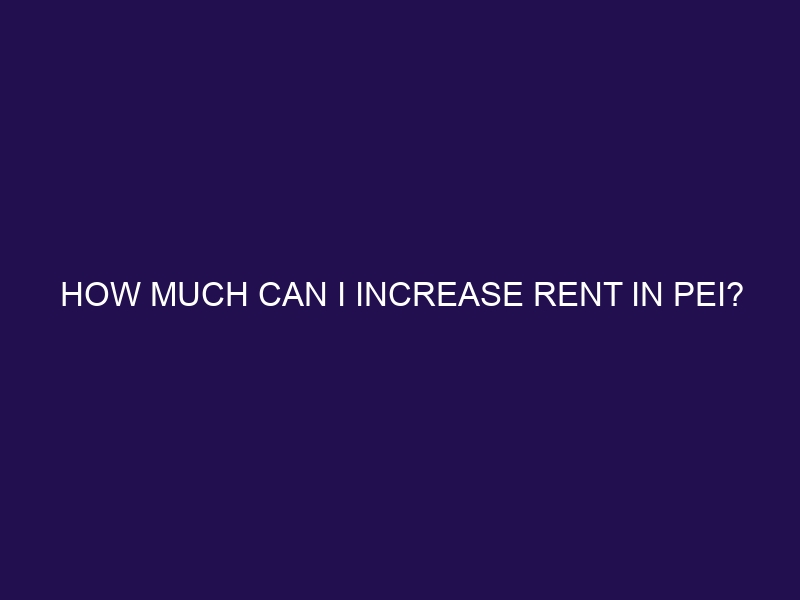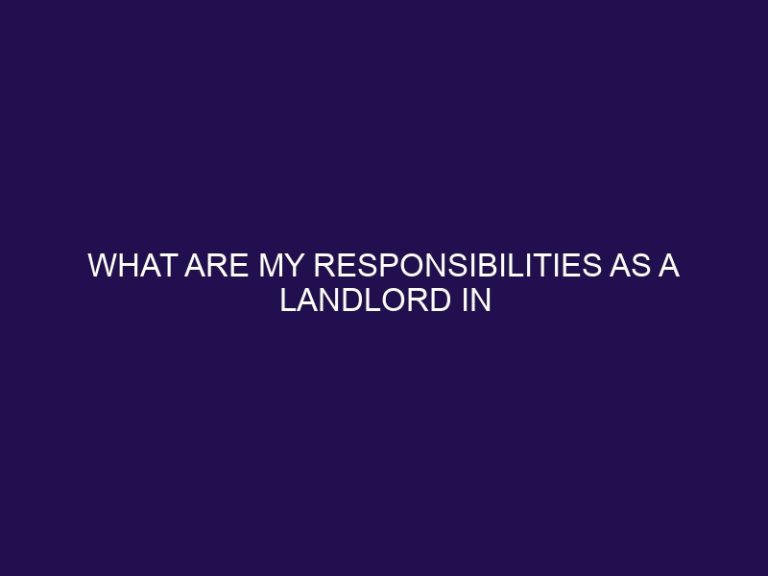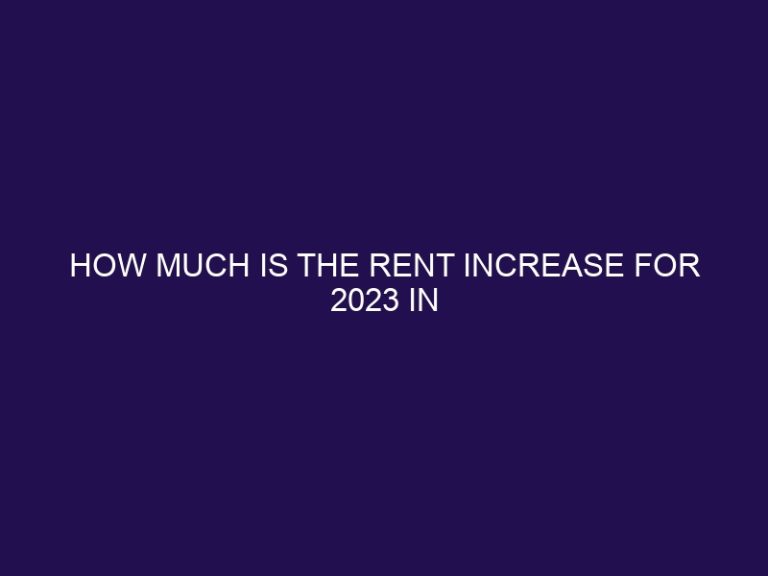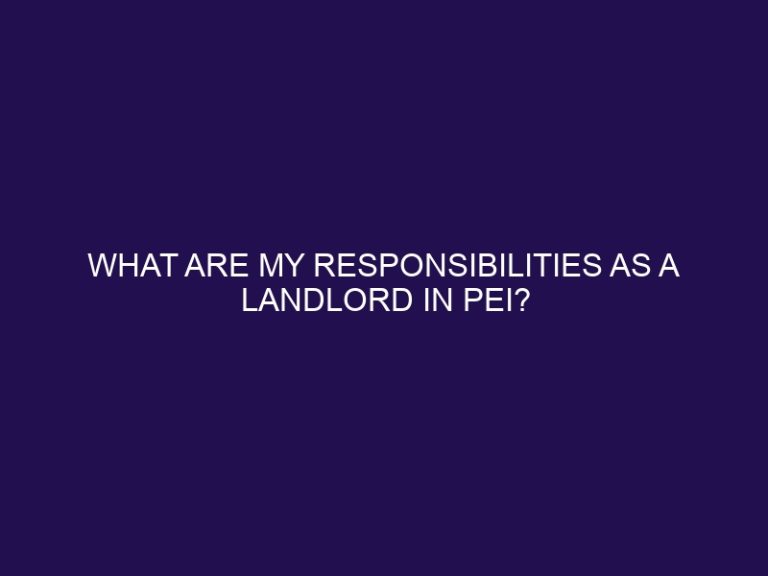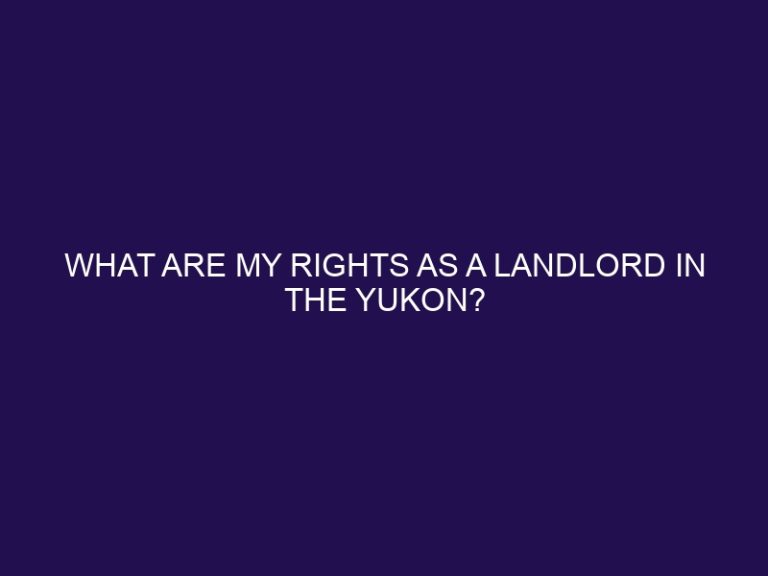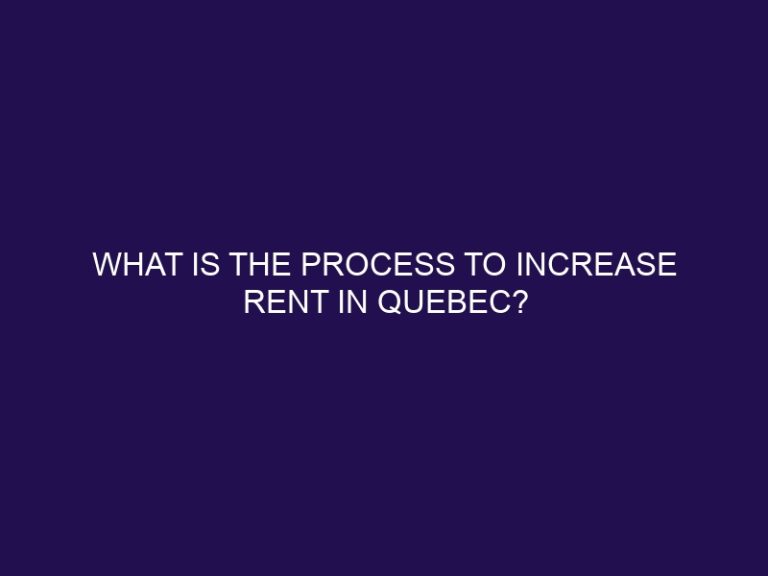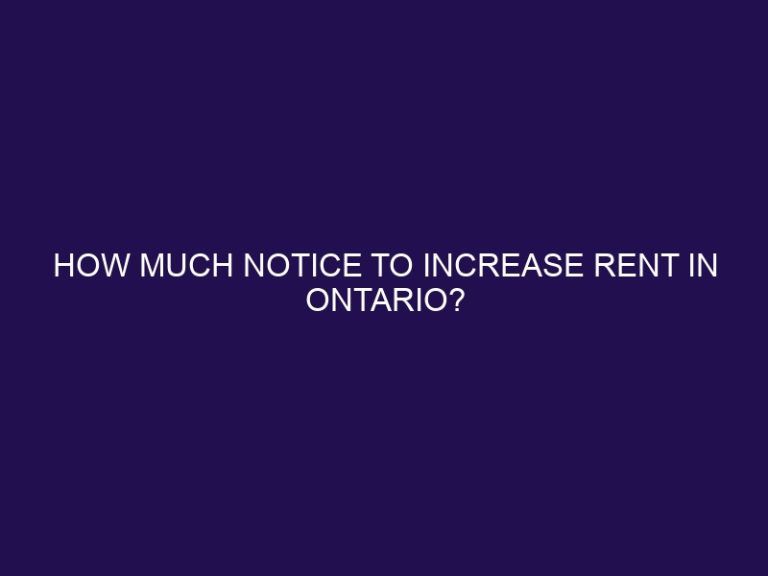How much can I increase rent in PEI?
.jpg)
Rent control policies play a crucial role in regulating the rental market and protecting tenants from unreasonable rent increases. In the context of Prince Edward Island (PEI), it is essential to understand the specific regulations regarding rent control.
Rent control refers to the government-imposed limitations on the amount and frequency of rent increases that landlords can impose on tenants. In PEI, the presence or absence of rent control laws determines the extent to which landlords can raise the rent.
To comprehend the regulations in PEI, let’s first explore the concept of rent control itself. Rent control laws place restrictions on how much a landlord can increase the rent for an existing tenant. These laws are designed to ensure that rental properties remain affordable and prevent unfair price hikes.
In the case of PEI, it is pertinent to delve into whether the province has any rent control laws in place. Understanding the legal landscape will help tenants and landlords navigate the process and know their rights and obligations.
Once the presence or absence of rent control laws is established, it is crucial to understand how much landlords can increase the rent in PEI. Legal limitations are placed on the amount of rent increase, and these limitations can vary depending on various factors. These factors include the specific regulations, inflation rates, and the housing market in Prince Edward Island.
Exceptions to rent increase limits may also exist in PEI. Certain situations or circumstances may arise where landlords are not restricted by the usual rent control regulations. It is important to be aware of these exceptions and understand when they may apply.
For landlords seeking to increase rent in PEI, it is essential to follow the proper steps to ensure compliance with the law. This includes providing notice to the tenant and following specific guidelines regarding the notice period and information that should be included.
In the event that a tenant challenges a rent increase, it is important to understand the potential consequences and how the dispute resolution process works.
By understanding rent control regulations in PEI and the specific guidelines for rental increases, both landlords and tenants can navigate the rental market with clarity and confidence.
Key takeaways:
- Rent control laws: PEI has rent control laws in place to regulate how much landlords can increase rent in order to protect tenants from excessive hikes.
- Legal limitations: There are legal limitations on rent increases in PEI, including specific rules on the frequency and amount of rent increases that landlords can impose.
- Factors affecting rent increases: The allowable rent increase in PEI is influenced by factors such as inflation, vacancy rates, and changes to operating costs for landlords.
Understanding Rent Control in PEI
Understanding Rent Control in PEI
Rent control in Prince Edward Island (PEI) is an essential aspect of ensuring affordable housing options and protecting tenants from unreasonable rent increases. The Rental of Residential Property Act in PEI dictates that landlords can only raise rent once every 12 months, and they must provide 3 months’ written notice to the tenants. However, there are exceptions to this rent control policy, such as when units become vacant or require major renovations.
In order to maintain a fair and balanced rental market, it is crucial for both landlords and tenants to understand the rent control laws in PEI. These laws play a significant role in addressing soaring rental prices, as witnessed by the government of PEI in 2019 when they introduced new rent control measures. The primary objective of these measures was to shield tenants from sudden and excessive rent increases, thereby creating more stability in the rental market.
Since the implementation of these rent control measures, tenants in PEI have experienced greater predictability in their housing costs. This predictability has brought them a sense of security and peace of mind, knowing that their rents will not skyrocket unexpectedly. Therefore, understanding rent control in PEI is vital for all stakeholders involved in the rental market.
What is Rent Control?
Rent control, also known as rent regulation, is a specific system put in place to govern the amount landlords can raise the rent for their tenants. In the province of PEI, rent control laws have been established to safeguard tenants from exorbitant rent increases. These laws impose restrictions on both the quantity and frequency of rent hikes. The specific amount by which rent can be increased is determined by considering several factors, including inflation rates and expenses related to property maintenance. It is important to note that certain situations may warrant exceptions to these limitations, particularly when a rental unit undergoes significant renovations. Landlords are obligated to adhere to specific procedures and provide appropriate notice when seeking to increase the rent. Rent control plays a critical role in ensuring that residents of PEI have access to housing options that remain affordable.
It’s interesting to know that rent control has been implemented in cities across the globe, such as New York City and Berlin, as a means to protect tenants from steep increases in rental prices.
Does PEI Have Rent Control Laws?
Yes, Prince Edward Island (PEI) does indeed have rent control laws. These laws have been put in place to limit the amount that landlords are allowed to increase rent and to provide necessary protections for tenants. Rent control ensures that any rent increase is reasonable and prevents any unfair practices from taking place. In PEI, the specific limitations on rent increases are determined by a variety of factors, including the Consumer Price Index and the current market rent. Landlords in PEI are obligated to comply with specific steps, which include providing notice to tenants and including all necessary information in the rent increase notice. However, it should be noted that there may be exceptions to these rent increase limits in certain situations.
How Much Can You Increase Rent in PEI?
Rent increases in PEI are regulated by the Prince Edward Island Rental of Residential Property Act. The allowable rent increase is determined annually by the Island Regulatory and Appeals Commission (IRAC). The annual rent increase guideline for the year 2022 is 1.5%, which answers the question “How Much Can You Increase Rent in PEI?”. Landlords cannot increase rent beyond this guideline without applying to the IRAC. There are exceptions for capital improvements made to the property. Landlords must provide tenants with written notice of any rent increase at least three months before the increase takes effect, as per the Notice Period for Rent Increase in PEI. It’s important for landlords to adhere to these regulations to ensure a fair and lawful rental process in PEI.
| Regulatory Body | Island Regulatory and Appeals Commission (IRAC) |
| Annual Rent Increase Guideline | 1.5% |
| Notice Period for Rent Increase | At least 3 months |
What Are the Legal Limitations on Rent Increases in PEI?
Legal Limitations on Rent Increases in PEI
The legal limitations on rent increases in PEI are determined by the Rent Control Act. Landlords in PEI are restricted in both the amount and frequency of rent increases they can implement. Under the Rent Control Act, there is a set percentage by which rent can be increased each year. This percentage takes into consideration various factors such as inflation and the average income of tenants in the region.
In addition to these restrictions, landlords in PEI must also provide proper notice to tenants before implementing a rent increase. This ensures that tenants have enough time to plan and make necessary adjustments to their budgets. The goal of these legal limitations is to protect tenants from facing unreasonable and sudden rent hikes that could potentially lead to financial hardships.
The Rent Control Act in PEI serves an essential purpose in maintaining affordable housing options for tenants. By regulating rent increases, it ensures that tenants have access to housing that remains reasonably priced and within their means. These legal measures aim to create a stable housing market in PEI and protect tenants’ rights.
How Often Can Landlords Increase Rent in PEI?
In PEI, the guidelines specified by the Residential Tenancies Act govern how often landlords can increase rent. Landlords are limited by rental laws and regulations in the province when it comes to the frequency of rent increases. Typically, they can only increase rent once every 12 months. To ensure compliance, it is crucial for both landlords and tenants to consult the specific regulations and guidelines set forth by the province. Understanding how often landlords can increase rent in PEI is essential in maintaining a fair and transparent rental market.
What Factors Affect the Allowable Rent Increase in PEI?
What Factors Affect the Allowable Rent Increase in PEI?
In Prince Edward Island (PEI), the allowable rent increase is influenced by several key factors. These factors include the Consumer Price Index (CPI), changes in operating costs for landlords, and any renovations or improvements made to the rental property. The CPI plays a significant role as it measures inflation and helps determine the maximum percentage by which rent can be increased. To justify a rent increase beyond the CPI guideline, landlords must provide evidence of any increased operating costs or renovations. These factors are in place to ensure that rent increases in PEI are both reasonable and fair for both landlords and tenants.
Exceptions to Rent Increase Limits in PEI
Some exceptions exist to the rent increase limits in PEI. These exceptions, known as Exceptions to Rent Increase Limits in PEI, apply when significant renovations or improvements have been made to the rental unit. In such cases, landlords can apply for a rent increase above the usual limit. If a new tenant moves into a previously unoccupied unit, the landlord can set the rent at any amount. It is important to note that these Exceptions to Rent Increase Limits in PEI have specific conditions and must be met for the rent increase to be allowed. It is always advisable for both landlords and tenants to familiarize themselves with the Rental of Residential Property Act to understand their rights and obligations.
In 2018, a landlord in Charlottetown used the exception provision, known as Exceptions to Rent Increase Limits in PEI, to increase the rent on an apartment after extensive renovations were done. The landlord had invested a considerable amount of money in modernizing the unit and argued that the increase was justified. While the tenant initially challenged the increase, a settlement was eventually reached, allowing for a revised rent amount. This case highlighted the importance of understanding the Exceptions to Rent Increase Limits in PEI and the need for clear communication between landlords and tenants.
Are There Any Situations Where Rent Increases Are Not Restricted in PEI?
Yes, there are situations where rent increases are not restricted in PEI. One such situation is when a rental unit is vacant. In PEI, landlords have the freedom to set the initial rent for a vacant unit without any limitations or restrictions. This means they can increase the rent as they see fit for new tenants. If a rental unit undergoes significant renovations or improvements that result in a substantial increase in value, landlords may be able to apply for an exemption from rent increase restrictions. Landlords must provide documentation and evidence to justify the need for the exemption.
What Steps Should Landlords Follow to Increase Rent in PEI?
To increase rent in PEI, landlords must follow specific steps mandated by the province’s Residential Tenancies Act. Here are the required steps:
- Review the current rental agreement to ensure it is legally enforceable.
- Provide tenants with written notice of the rent increase at least three months before the proposed increase takes effect.
- Ensure the notice includes the amount of the increase, the date it will take effect, and the reasons for the increase.
- Submit the notice to the Residential Tenancies Office and keep a copy for your records.
What Steps Should Landlords Follow to Increase Rent in PEI?
It is helpful to:
- Research comparable rentals in the area to ensure the proposed increase is reasonable and competitive.
- Communicate openly and honestly with tenants about the reasons behind the rent increase.
- Offer incentives or additional services to justify the increase and maintain a positive relationship with tenants.
- Follow up with tenants to address any concerns or questions they may have regarding the rent increase.
What Notice Period is Required for Rent Increases in PEI?
In PEI, landlords must provide their tenants with a notice period for rent increases. The specific notice period required is determined by the type of tenancy agreement. For month-to-month agreements, landlords are obligated to give tenants three months’ notice before increasing the rent. Conversely, in the case of fixed-term agreements, landlords are required to wait until the end of the current term and provide at least three months’ notice for any prospective rent increase. It is crucial for landlords to adhere to these notice requirements to ensure compliance with the regulations and maintain a harmonious relationship with their tenants.
What Notice Period is Required for Rent Increases in PEI?
What Information Should be Included in the Rent Increase Notice?
In a rent increase notice in PEI, it is important to include specific information to ensure compliance with the law and avoid any disputes with tenants. The notice should include the following details:
| 1. The date of the notice and the effective date of the rent increase. |
| 2. The current rent amount and the proposed new rent amount. |
| 3. A clear explanation of the reason for the rent increase, such as increased property taxes or maintenance costs. |
| 4. Any changes to the terms of the lease agreement that will accompany the rent increase. |
| 5. The landlord’s contact information, including name, address, and phone number. |
| 6. Information about the tenant’s rights to dispute the rent increase, including any applicable procedures or timelines. |
What Information Should be Included in the Rent Increase Notice?
A landlord in PEI once failed to include the proposed new rent amount in the rent increase notice. As a result, the tenant successfully challenged the rent increase, and the landlord had to retract the notice and provide a corrected version. This incident highlights the importance of including all necessary information in the rent increase notice to avoid legal complications.
What Happens if the Rent Increase is Challenged by the Tenant?
If a tenant challenges a rent increase in PEI, they must follow certain steps and processes. The tenant can dispute the rent increase by filing a dispute resolution application with the Rental Appeals Board. The board will then schedule a hearing to review the case and determine what happens if the rent increase is challenged by the tenant. During the hearing, both the landlord and tenant will have the opportunity to present their arguments, evidence, and witnesses. The board will make a decision based on the evidence presented and the applicable laws. If the tenant is successful in challenging the rent increase, the board may determine a fair rent amount or even reverse the increase. It is crucial for both landlords and tenants to understand their rights and obligations when it comes to rent increases and disputes.
In 1971, New York City implemented rent control measures to regulate rental prices. These measures were taken to protect tenants from exorbitant rent increases and ensure affordable housing options. The Rent Stabilization Law put a cap on the amount that landlords could increase rents each year. This legislation helped stabilize the rental market and provided security for tenants. Rent control has been a contentious issue, with some arguing that it discourages investment in rental properties and ultimately reduces the availability of affordable housing. The debate surrounding rent control continues to this day, with different opinions on its effectiveness and long-term impact.
Some Facts About How Much Can I Increase Rent in PEI:
- ✅ In 2024, rent hikes on Prince Edward Island (P.E.I.) will be capped at 3%. (Source: CBC News)
- ✅ Landlords can raise rents by 3% without permission from the Island Regulatory and Appeals Board (IRAC). (Source: CBC News)
- ✅ Landlords can apply to IRAC for an additional 3% increase, making a total of 6% over the 2023 rent. (Source: CBC News)
- ✅ Rent increases in P.E.I. are limited to once every 12 months for each tenant. (Source: CBC News)
- ✅ The maximum annual allowable rent increase in 2024 is determined by a formula, calculated at 6.1%. (Source: CBC News)
Frequently Asked Questions
1. How much can landlords increase rent in PEI?
Landlords in PEI can increase rent by a maximum of 3% without requiring approval from the Island Regulatory and Appeals Board (IRAC). They can apply for an additional 3% increase, making a total of 6% over the previous year’s rent, but they must provide valid arguments for why they need it.
2. What is the maximum allowable rent increase in PEI for 2024?
The maximum allowable rent increase in PEI for 2024 is determined by a formula in the Residential Tenancy Act, taking into account the year-over-year percentage change in the Consumer Price Index. The calculated increase for 2024 is 6.1%.
3. Can landlords raise the rent for each tenant in PEI every year?
No, landlords in PEI can only raise the rent for each tenant once every 12 months. They must provide at least three months’ notice to tenants before implementing a rent increase.
4. Is there any separate legislation that affects rent increases in PEI?
Yes, a separate legislation passed by the provincial government capped rent increases at 0% for 2023 due to the impact of inflation on low or fixed-income Islanders. This was implemented in addition to the guidelines set by the Residential Tenancy Act.
5. What happens if landlords want to increase rent beyond the allowable amount?
If landlords in PEI want to increase rent beyond the allowable amount set by the Residential Tenancy Act, they can apply to the Island Regulatory and Appeals Board (IRAC) for approval. They need to follow the standard procedure and provide valid reasons for the higher increase.
6. Can tenants challenge a rent increase in PEI?
Yes, tenants in PEI have the right to challenge a rent increase if they believe it is unjustified. They can do so by following the appropriate procedures outlined by the Residential Tenancy Act and seeking assistance from the provincial rental office or tenants’ rights groups.

